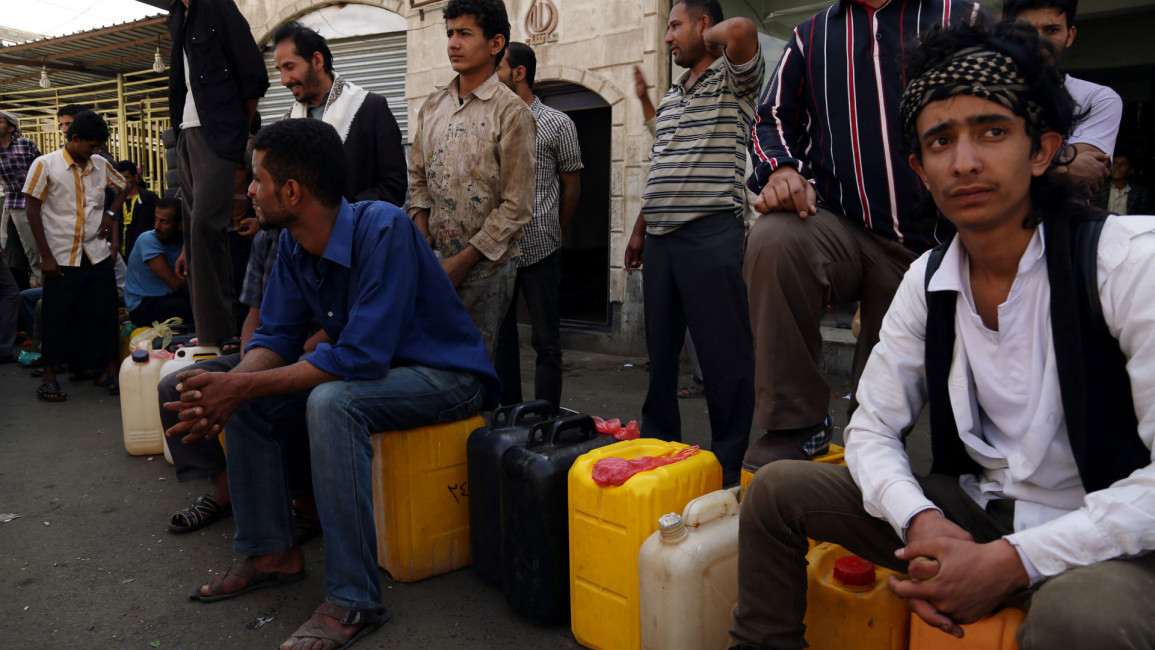Humanitarian crisis in Yemen's Taiz
Humanitarian crisis in Yemen's Taiz
Residents in Taiz and other parts of Yemen are enduring shortages of food, fuel and medicine, with government institutions shut and security forces absent.
2 min read
Fuel shortages are contributing to the humanitarian crisis in Yemen [Anadolu]
The humanitarian crisis in the city of Taiz has deteriorated alongside the security situation as the Houthis continue their advance.
Residents in Yemen's third largest city are suffering from shortages of food, supplies, fuel and electricity. Government institutions have closed and there are no security forces on the city's streets.
Three people were killed on Monday in front of three different petrol stations a security source told al-Araby al-Jadeed. They were killed in an exchange of fire with armed men hired by the station owners to protect their property.
Eyewitnesses say people have been queuing for two days or more to collect their quota of 40 litres of petrol per vehicle. Fuel pumps have been nearly dry for two weeks.
An official source at the Taiz branch of Yemen's state run oil company told al-Araby al-Jadeed they could not meet market demands. Heavy fighting between the Houthis and forces loyal to Yemeni President Abd Rabbo Mansour Hadi in Aden has closed the road between Taiz and Aden, and stopped the transportation of fuel. Fuel products come from refineries in Aden, south of Yemen.
Residents suffer from power cuts lasting between seven to 24 hours a day. This is especially hard with temperatures rising as summer approaches.
Food prices have also risen with some traders taking advantage of shortages. For example, the price of flour has risen to over $39 a bag.
According to various sources in Yemen, other governorates including Aden, Lahij, Abyan, Hadhramaut and Sanaa are facing a similar crisis. Fuel stations have closed, crippling economic activity and raising fears of food shortages among residents.
This article is an edited translation from our Arabic edition.
Residents in Yemen's third largest city are suffering from shortages of food, supplies, fuel and electricity. Government institutions have closed and there are no security forces on the city's streets.
Three people were killed on Monday in front of three different petrol stations a security source told al-Araby al-Jadeed. They were killed in an exchange of fire with armed men hired by the station owners to protect their property.
| People have been queuing for two days or more to collect their quota of 40 litres of petrol per vehicle. |
Eyewitnesses say people have been queuing for two days or more to collect their quota of 40 litres of petrol per vehicle. Fuel pumps have been nearly dry for two weeks.
An official source at the Taiz branch of Yemen's state run oil company told al-Araby al-Jadeed they could not meet market demands. Heavy fighting between the Houthis and forces loyal to Yemeni President Abd Rabbo Mansour Hadi in Aden has closed the road between Taiz and Aden, and stopped the transportation of fuel. Fuel products come from refineries in Aden, south of Yemen.
Residents suffer from power cuts lasting between seven to 24 hours a day. This is especially hard with temperatures rising as summer approaches.
Food prices have also risen with some traders taking advantage of shortages. For example, the price of flour has risen to over $39 a bag.
According to various sources in Yemen, other governorates including Aden, Lahij, Abyan, Hadhramaut and Sanaa are facing a similar crisis. Fuel stations have closed, crippling economic activity and raising fears of food shortages among residents.
This article is an edited translation from our Arabic edition.



